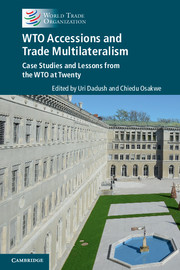Book contents
- Frontmatter
- Dedication
- Contents
- List of contributors
- Foreword
- Acknowledgements
- List of abbreviations
- Editors' note
- PART I WTO accessions, the trading system and the global economy
- 1 A reflection on accessions as the WTO turns twenty
- 2 Developments in the global economy and trading system effects: the transformation of world trade
- 3 The WTO and the global economy: contemporary challenges and possible responses
- 4 The structural reform implications of WTO accession
- 5 The macroeconomic implications of WTO accession
- 6 The future of Asia: unleashing the power of trade and governance
- 7 Eurasian Economic Union integration: timetable, priorities and challenges
- 8 WTO accessions: what does the academic literature say?
- PART II Overview: systemic outcomes from accessions
- PART III Members’ perspectives on accession negotiations
- PART IV Working party chairpersons’ perspectives on accession negotiations
- PART V Salient features inWTOAccession Protocols
- PART VI Conclusion
- Annex: Contributor biographies
- Index
- Plate section
- References
2 - Developments in the global economy and trading system effects: the transformation of world trade
from PART I - WTO accessions, the trading system and the global economy
Published online by Cambridge University Press: 05 November 2015
- Frontmatter
- Dedication
- Contents
- List of contributors
- Foreword
- Acknowledgements
- List of abbreviations
- Editors' note
- PART I WTO accessions, the trading system and the global economy
- 1 A reflection on accessions as the WTO turns twenty
- 2 Developments in the global economy and trading system effects: the transformation of world trade
- 3 The WTO and the global economy: contemporary challenges and possible responses
- 4 The structural reform implications of WTO accession
- 5 The macroeconomic implications of WTO accession
- 6 The future of Asia: unleashing the power of trade and governance
- 7 Eurasian Economic Union integration: timetable, priorities and challenges
- 8 WTO accessions: what does the academic literature say?
- PART II Overview: systemic outcomes from accessions
- PART III Members’ perspectives on accession negotiations
- PART IV Working party chairpersons’ perspectives on accession negotiations
- PART V Salient features inWTOAccession Protocols
- PART VI Conclusion
- Annex: Contributor biographies
- Index
- Plate section
- References
Summary
ABSTRACT
The Great Recession of 2008–2009 tested the resilience of economies across the world and placed enormous strain on the frameworks underpinning global cooperation. In no arena was the test more severe than in world trade, which, against a background of collapsing output and surging unemployment in the industrialised countries, fell about one-quarter in the first half of 2009, a rate of decline that exceeded the worst years of the Great Depression of the 1930s. Although the rate of recovery remains sluggish and the pace of trade liberalisation has slowed, a relapse into protectionism has been avoided and world trade volumes have surpassed the pre-crisis peak by some 25 per cent. The world trading system seems to have passed this most strenuous of tests. This chapter examines how two great changes in the global economic landscape, deepening trade integration (trade as a means of production as well as consumption), and the rising weight of developing countries, are changing trade and investment flows and creating new challenges for policy-makers.
This chapter aims to examine the state of world trade as the effects of the Great Recession (2008–2009) dissipate and to identify some of the trends that are determining its mass and defining its contours. It will document how world trade is currently undergoing a profound transformation driven primarily by two fundamental forces: the progressive embedding of trade and foreign investment in domestic as well as international production and distribution chains, making the fabric of global and domestic production effectively inseparable; and the rise of developing countries as the main drivers of global demand as well as shapers of new patterns of comparative advantage.
Despite the difficulties confronting trade negotiations under the Doha Development Agenda and the many uncertainties surrounding the new mega-regional initiatives, such as the Trans-Pacific Partnership (TPP) and Transatlantic Trade and Investment Partnership (TTIP), the prospects for continued expansion of trade remain positive, due to a combination of technological, economic and domestic policy factors.
Progress could be much faster, however. Studies using gravity models have shown that world trade remains well below its theoretical maximum relative to world gross domestic product (GDP), even though it has come significantly closer to that benchmark over the last thirty years. Moreover, there are plenty of risks and pitfalls that could slow it again.
- Type
- Chapter
- Information
- WTO Accessions and Trade MultilateralismCase Studies and Lessons from the WTO at Twenty, pp. 25 - 51Publisher: Cambridge University PressPrint publication year: 2015



